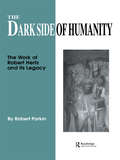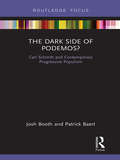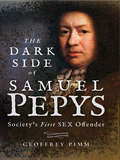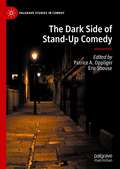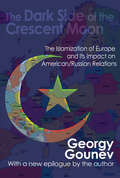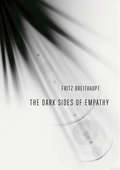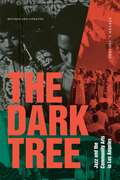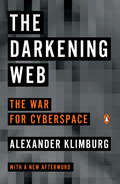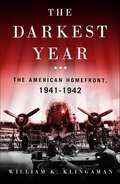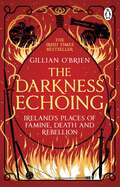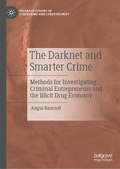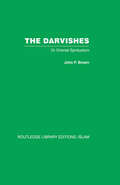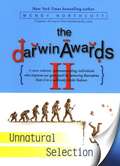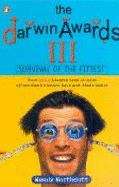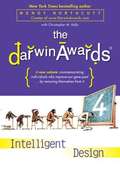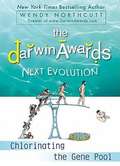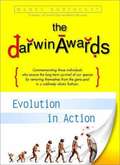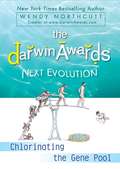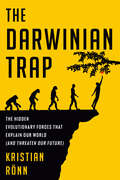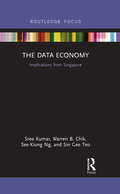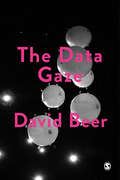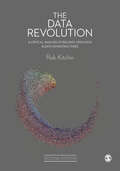- Table View
- List View
The Dark Side of Humanity: The Work of Robert Hertz and its Legacy
by Robert ParkinRobert Parkin's book gives a reading of each of these texts before going on to show their subsequent influence on anthropologists in particular. Hertz's activities as reviewer and phamphleteer are also covered. The introductory biographical chapter drawing on Hertz's surviving papers in the Collège de France, shows his own ambivalence towards his academic career and it also attempts to clarify the circumstances leading up to his apparently gratuitous death in the First World War. Two further chapters attempt to situate his work in the broader context of Durkheimian sociology.
The Dark Side of Podemos?: Carl Schmitt and Contemporary Progressive Populism (Routledge Advances in Sociology)
by Patrick Baert Josh BoothIn 2014 a new progressive party, Podemos, emerged on the Spanish political scene. Within just over two years it had become the country’s third-biggest party, winning a slew of seats in parliament and regularly making headline news. While some see Podemos as the saviour of Spanish democracy, others have accused it of corrosive populism. But what few have noticed is that behind its distinctive rhetoric lies a thinker closely associated with Germany’s Third Reich: Carl Schmitt. Why has an ostensibly progressive and avowedly anti-fascist political party taken up Schmitt’s ideas? The puzzle only deepens when we learn of Schmitt’s links with Francisco Franco’s dictatorship. In The Dark Side of Podemos?, Booth and Baert explain why Schmittian theory resonated with Podemos’ founders. In doing so, the authors position Podemos and the ideas that guide it within the context of recent Spanish history and ongoing politics of memory, revealing a story about how personal and political narratives have combined to produce a formidable political force. This enlightening monograph will appeal to undergraduates and postgraduates, as well as postdoctoral researchers, interested in fields such as Politics, Political Theory and Sociology. It will also be relevant to those curious about contemporary Spanish politics, the nature of populism, the future of the European left, or Carl Schmitt and his links with Spain.
The Dark Side of Samuel Pepys: Society's First Sex Offender
by Geoffrey PimmThis historical biography reveals how the famous diarist of Restoration England used his professional position to act as a sexual predator. Samuel Pepys is popularly known as the founder of the modern navy, a member of the Royal Society and, most of all, as a unique and frank diarist. Less well known is that he was a serial sexual offender by modern standards; a voyeur, a groper, and a rapist. Set against the London society of Charles II&’s restoration, and extensively using Pepys&’ own words, this book concerns his numerous extramarital affairs. It demonstrates how he used his position of power and influence to advance the careers of his subordinates—in return for the sexual favors of their wives. With his own descriptions, translated from the strange mix of languages and the seventeenth-century shorthand he used to camouflage the content, the reader witnesses in graphic detail how Pepys set about achieving his lascivious objectives – on occasion resorting to physical force where persuasion or bribery failed. Whether she be wife, daughter, mother, or humble maidservant, no woman was safe from his rapacious sexual appetite.
The Dark Side of Stand-Up Comedy (Palgrave Studies in Comedy)
by Patrice A. Oppliger Eric ShouseThis book focuses on the “dark side” of stand-up comedy, initially inspired by speculations surrounding the death of comedian Robin Williams. Contributors, those who study humor as well as those who perform comedy, join together to contemplate the paradoxical relationship between tragedy and comedy and expose over-generalizations about comic performers’ troubled childhoods, addictions, and mental illnesses. The book is divided into two sections. First, scholars from a variety of disciplines explore comedians’ onstage performances, their offstage lives, and the relationship between the two. The second half of the book focuses on amateur and lesser-known professional comedians who reveal the struggles they face as they attempt to hone successful comedy acts and likable comic personae. The goal of this collection is to move beyond the hackneyed stereotype of the sad clown in order to reveal how stand-up comedy can transform both personal and collective tragedies by providing catharsis through humor.
The Dark Side of the Crescent Moon: The Islamization of Europe and its Impact on American/Russian Relations
by Georgy GounevThe Dark Side of the Crescent Moon constitutes a historical and political analysis of the growth of radical Islam throughout the world. It shows how the spread of radical Islam in Europe drove the United States and Russia to become allies of necessity, in order to confront a shared danger. Georgy Gounev provides readers with a detailed assessment of the people, countries, and global movements that factor into Islam's mounting threat.From the evolution and history of radical Islam to the role of the United States and Russia in the rise of Islam, the author lays out the factors contributing to this global phenomenon. Taking the reader from Chechnya and Kosovo, to Sudan and Somalia, to Afghanistan and Iraq, Gounev explores the motivations that lurk beneath the surface of active conflict, and extend the threat to the shores of Britain, Russia, and even the United States. He illuminates the vast network that is actively transmitting the political and religious dogma of radical Islam. Casting a cold eye on the theocratic fundamentalism emanating from Iran and Saudi Arabia, Gounev sounds an alarm about a growing threat both outside and inside our borders.
The Dark Side of the Ivory Tower: Campus Crime as a Social Problem
by John J. Sloan III Bonnie S. FisherA cursory reading of the history of U. S. colleges and universities reveals that campus crime has been part of collegiate life since the Colonial Era, yet it was not until the late 1980s that it suddenly became an issue on the public stage. Drawing from numerous mass media and scholarly sources and using a theoretical framework grounded in social constructionism, this text chronicles how four groups of activists - college student advocates, feminists, victims and their families, and public health experts - used a variety of tactics and strategies to convince the public that campus crime posed a new danger to the safety and security of college students and the ivory tower itself, while simultaneously convincing policymakers to take action against the problem. Readers from a range of disciplinary interests will find the book both compelling and valuable to understanding campus crime as a newly constructed social reality.
The Dark Sides of Empathy
by Fritz BreithauptMany consider empathy to be the basis of moral action. However, the ability to empathize with others is also a prerequisite for deliberate acts of humiliation and cruelty. In The Dark Sides of Empathy, Fritz Breithaupt contends that people often commit atrocities not out of a failure of empathy but rather as a direct consequence of over-identification and a desire to increase empathy. Even well-meaning compassion can have many unintended consequences, such as intensifying conflicts or exploiting others.Empathy plays a central part in a variety of highly problematic behaviors. From mere callousness to terrorism, exploitation to sadism, and emotional vampirism to stalking, empathy all too often motivates and promotes malicious acts. After tracing the development of empathy as an idea in German philosophy, Breithaupt looks at a wide-ranging series of case studies—from Stockholm syndrome to Angela Merkel's refugee policy and from novels of the romantic era to helicopter parents and murderous cheerleader moms—to uncover how narcissism, sadism, and dangerous celebrity obsessions alike find their roots in the quality that, arguably, most makes us human.
The Dark Tree: Jazz and the Community Arts in Los Angeles
by Steven L. IsoardiIn the early 1960s, pianist Horace Tapscott gave up a successful career in Lionel Hampton’s band and returned to his home in Los Angeles to found the Pan Afrikan Peoples Arkestra, a community arts group that focused on providing community-oriented jazz and jazz training. Over the course of almost forty years, the Arkestra, together with the related Union of God’s Musicians and Artists Ascension collective, was at the forefront of the vital community-based arts movement in Black Los Angeles. Some three hundred artists—musicians, vocalists, poets, playwrights, painters, sculptors, and graphic artists—passed through these organizations, many ultimately remaining within the community and others moving on to achieve international fame. In The Dark Tree, Steven L. Isoardi draws on one hundred in-depth interviews with the Arkestra’s participants to tell the history of the important and largely overlooked community arts movement of Black Los Angeles. This revised and updated edition brings the story of the Arkestra up to date, as its ethos and aesthetic remain vital forces in jazz and popular music to this day.
The Darkening Web: The War for Cyberspace
by Alexander Klimburg"A chilling but well-informed and readable tour of cyber interdependence. Anyone interested in our growing global vulnerabilities should read this book.”—Joseph S. Nye, Jr., author of The Future of PowerNo single invention of the last half century has changed the way we live now as much as the Internet. Alexander Klimburg was a member of the generation for whom it was a utopian ideal turned reality: a place where ideas, information, and knowledge could be shared and new freedoms found and enjoyed. Two decades later, the future isn’t so bright any more: increasingly, the Internet is used as a weapon and a means of domination by states eager to exploit or curtail global connectivity in order to further their national interests. Klimburg is a leading voice in the conversation on the implications of this dangerous shift, and in The Darkening Web, he explains why we underestimate the consequences of states’ ambitions to project power in cyberspace at our peril: Not only have hacking and cyber operations fundamentally changed the nature of political conflict—ensnaring states in a struggle to maintain a precarious peace that could rapidly collapse into all-out war—but the rise of covert influencing and information warfare has enabled these same global powers to create and disseminate their own distorted versions of reality in which anything is possible. At stake are not only our personal data or the electrical grid, but the Internet as we know it today—and with it the very existence of open and democratic societies. Blending anecdote with argument, Klimburg brings us face-to-face with the range of threats the struggle for cyberspace presents, from an apocalyptic scenario of debilitated civilian infrastructure to a 1984-like erosion of privacy and freedom of expression. Focusing on different approaches to cyber-conflict in the US, Russia and China, he reveals the extent to which the battle for control of the Internet is as complex and perilous as the one surrounding nuclear weapons during the Cold War—and quite possibly as dangerous for humanity as a whole. Authoritative, thought-provoking, and compellingly argued, The Darkening Web makes clear that the debate about the different aspirations for cyberspace is nothing short of a war over our global values.
The Darkest Year: The American Homefront, 1941–1942
by William K. KlingamanThe acclaimed narrative history of the American home front during WWII, from the attack on Pearl Harbor through 1942.For Americans on the home front, the twelve months following the Japanese attack on Pearl Harbor comprised the darkest year of World War Two. Despite government attempts to disguise the magnitude of American losses, it was clear that the nation had suffered a nearly unbroken string of military setbacks in the Pacific; by the autumn of 1942, government officials were openly acknowledging the possibility that the United States might lose the war.Appeals for unity and declarations of support for the war effort made it appear as though the class hostilities and partisan animosities that had beset the United States for decades had suddenly disappeared. Yet a deeply divided American society was splintering even further as conflicting interest groups sought to turn the wartime emergency to their own advantage. Meanwhile, blunders and repeated displays of incompetence by the Roosevelt administration added to the sense of anxiety and uncertainty that hung over the nation.The Darkest Year focuses on Americans’ state of mind not only through what they said, but in the day-to-day details of their behavior. William K. Klingaman delves into the social and cultural changes wrought by war, including shifts in family roles, race relations, economic pursuits, popular entertainment, education, and the arts.
The Darkness Echoing: Exploring Ireland’s Places of Famine, Death and Rebellion
by Dr Gillian O'BrienThe Irish Times Top 10 Bestseller!From war to revolution, famine to emigration, The Darkness Echoing travels around Ireland bringing its dark past to lifeIt's no secret that the Irish are obsessed with misery, suffering and death. And no wonder, for there is darkness everywhere you look: in cemeteries and castles, monuments and museums, stories and songs. In The Darkness Echoing, Gillian O'Brien tours Ireland's most deliciously dark heritage sites, delving into the stories behind them and asking what they reveal about the Irish.Energetic, illuminating and surprisingly funny, The Darkness Echoing challenges old, accepted narratives about Ireland, and asks intriguing questions about Ireland's past, present and future.'My history book of the year' Ryan Tubridy'As thought-provoking as it is informative and entertaining' Irish Times'Hugely enjoyable, thought-provoking and informative ... An essential read' History Ireland
The Darknet and Smarter Crime: Methods for Investigating Criminal Entrepreneurs and the Illicit Drug Economy (Palgrave Studies in Cybercrime and Cybersecurity)
by Angus BancroftThis book draws on research into darknet cryptomarkets to examine themes of cybercrime, cybersecurity, illicit markets and drug use. Cybersecurity is increasingly seen as essential yet it is also a point of contention between citizens, states, non-governmental organisations and private corporations as each grapples with existing and developing technologies. The increased importance of privacy online has sparked concerns about the loss of confidentiality and autonomy in the face of state and corporate surveillance on one hand, and the creation of ungovernable spaces and the facilitation of terrorism and harassment on the other. These differences and disputes highlight the dual nature of the internet: allowing counter-publics to emerge and providing opportunities for state and corporate domination through control of the data infrastructure. The Darknet and Smarter Crime argues that, far from being a dangerous anarchist haven, the darknet and the technologies used within it could have benefits and significance for everyone online. This book engages with a number of debates about the internet and new communication technologies, including: surveillance and social control, anonymity and privacy, the uses and abuses of data encryption technologies and cyber-cultures and collective online identities
The Darvishes: Or Oriental Spiritualism
by John P. BrownThe Darvishes is an invaluable contribution to the study of the Belief and spiritual principles of the Darvish Orders and is one of the most accurate reference works on the subject. Drawn exclusively from the original Oriental works, and from Turkish, Arabic and Persian manuscripts the originality and authenticity of the work is beyond doubt. As well as discussing Darvish doctrines and history, the volume also examines the spiritual and metaphysical significance of Sufism as a living tradition
The Darwin Awards II
by Wendy NorthcuttWelcome to the next evolution in humor.In the spirit of Charles Darwin, the father of evolution, The Darwin Awards II: Unnatural Selection brings together a fresh collection of magnificent misadventures, honoring those who continue to improve our gene pool by removing themselves from it in a sublimely idiotic fashion.Salute the owner of an equipment training school who demonstrates the dangers of driving a forklift by failing to survive the filming of his own safety video. Heed the story of the honest bricklayer who loses a battle of wits with 300 pounds of tools. Witness the man who becomes a victim of his own ldquo;strange and unusual passion for jumping into rivers.rdquo; And watch Darwin Award winners selflessly join the ongoing fight against the seven deadly sins as lust, vanity, gluttony, greed, sloth, envy and wrath all exact their evolutionary toll on the overindulgent.Featuring science and safety discussions designed to aid those vigilant enough to avoid the scythe of natural selection, and including the most inspiring dozen Darwin Awards from the last century, this new compendium of serious humor and cautionary tales -verified by the author and endorsed by website readers -shows us anew how uncommon common sense can be.
The Darwin Awards III
by Wendy NorthcuttThe humour evolution takes another giant step One of the human race's most popular humour series returns with a brand-new collection of hilariously macabre mishaps and misadventures, honouring those who improve our gene pool by inadvertently removing themselves from it. The Darwin Awards III: Survival of the Fittest shows once more how uncommon common sense still is. Celebrate Darwin Award winners who made the 'ultimate sacrifice'; wonder at the misguided pluck of Honorable Mentions who survived their own bad judgment, and look on in awestruck amusement at Personal Accounts shared by the perpetrators themselves. From the sheriff who inadvertently shot himself twice to the insurance defrauder who amputated his leg with a chainsaw, The Darwin Awards III proves again that when it comes to stupidity, we are the most advanced species on the planet.
The Darwin Awards IV: Intelligent Design
by Wendy NorthcuttThe first new Darwin Awards book in three years, The Darwin Awards 4: Intelligent Design is the latest addition to one of the most popular and successful humor franchises on bookshelves today. Named after Charles Darwin, the father of evolution, The Darwin Awards pays homage to those who improve our gene pool by removing themselves from it. Most of us know instinctively that the phrase "trust me, light this fuse" is a recipe for disaster. Darwin Award winners do not. Most of us have basic sound judgment that eliminates the need for NO SMOKING signs at gas stations. Darwin Award winners do not. No warning label could have prevented evolution from creeping up on the homeowner who filled his house with natural gas to kill termites, the easy rider who decided to steer his motorcycle with his feet, or the winner who tried to weld a hand grenade onto a chain. Filled with more than one hundred new tales of evolution in action, and complete with essential science and safety discussions, The Darwin Awards 4: Intelligent Design shows that when it comes to common sense, natural selection still has a long way to go.
The Darwin Awards Next Evolution: Chlorinating the Gene Pool
by Wendy NorthcuttThe hilarious New York Times bestselling phenomenon—more than 1.5 million copies sold! New York Times bestselling author Wendy Northcutt is back, asking, Have we evolved at all? The answer: Not all of us. What crazy cocktail of DNA leads Homo sapiens to do pull-ups off the edge of a seventh-floor balcony or wrap their lips around a paintball gun and pull the trigger? How about offering a beer to a bear or self-testing a Taser? Why not go joyriding in a shopping cart strapped to an SUV or jump a drawbridge on a bicycle? Fully illustrated with over a hundred new jaw-dropping and side-splitting feats of stupidity—and including science essays by guest writers and answers to FAQs about evolution in action—The Darwin Awards Next Evolution continues the tradition of honoring the victims of appallingly poor survival instinct who selflessly improve our gene pool by removing themselves from it.
The Darwin Awards: Next Evolution
by Wendy NorthcuttEvolution takes a giant step forward with the fifth edition of the New York Times best selling phenomenon. The human race's most popular humor series returns with a new collection of macabre mishaps and misadventures. Honoring those who improve our gene pool by inadvertently removing themselves from it, The Darwin Awards Next Evolutionshows how uncommon common sense still is.
The Darwinian Trap: The Hidden Evolutionary Forces That Explain Our World (and Threaten Our Future)
by Kristian RönnA provocative exploration of how humans are wired to seek short-term success at the expense of long-term survival—an evolutionary &“glitch&” that explains everything from toxic workplaces to climate change&“Essential reading . . . a lively, ultimately hopeful examination of how incentivizing the wrong values and actions has led to some of our most intractable problems.&”—Eric Ries, New York Times bestselling author of The Lean StartupWhen people talk about today&’s biggest challenges—pollution, misinformation, artificial intelligence, inept CEOs, and politicians—they tend to frame the conversation around &“bad people&” doing &“bad things.&” But is there more to the story?Humans, it turns out, are intrinsically wired to seek short-term success at the expense of long-term prosperity. Kristian Rönn, an entrepreneur formerly affiliated with the University of Oxford&’s Future of Humanity Institute, calls these deeply rooted impulses &“Darwinian demons.&” These forces, a by-product of natural selection, can lead us to act in shortsighted ways that harm others—and even imperil our survival as a species. If this evolutionary glitch is left unchecked, the consequences will grow in magnitude as the power of technology accelerates.In this eye-opening work, Rönn shows that we must learn to cooperate in new ways if we are to escape these evolutionary traps in our daily lives and solve our biggest existential threats. Evolution may be to blame for the trap—but humans need not fall for it. Our salvation, he writes, will involve the creation of new systems that understand, track, and manage what humankind values most.Bold, brilliant, and ultimately optimistic, The Darwinian Trap gives readers a powerful new lens on our world and its problems, and invites us to rethink our priorities for the sake of generations to come.
The Data Economy: Implications from Singapore (Routledge Research in Public Administration and Public Policy)
by Sree Kumar Warren B. Chik See-Kiong Ng Sin Gee Teo"The data economy" is a term used by many, but properly understood by few. Even more so the concept of "big data". Both terms embody the notion of a digital world in which many transactions and data flows animate a virtual space. This is the unseen world in which technology has become the master, with the hand of the human less visible. In fact, however, it is human interaction in and around technology that makes data so pervasive and important – the ability of the human mind to extract, manipulate and shape data that gives meaning to it. This book outlines the findings and conclusions of a multidisciplinary team of data scientists, lawyers, and economists tasked with studying both the possibilities of exploiting the rich data sets made available from many human–technology interactions and the practical and legal limitations of trying to do so. It revolves around a core case study of Singapore’s public transport system, using data from both the private company operating the contactless payment system (EZ-Link) and the government agency responsible for public transport infrastructure (Land Transport Authority). In analysing both the possibilities and the limitations of these data sets, the authors propose policy recommendations in terms of both the uses of large data sets and the legislation necessary to enable these uses while protecting the privacy of users.
The Data Gaze: Capitalism, Power and Perception (Society and Space)
by David BeerA significant new way of understanding contemporary capitalism is to understand the intensification and spread of data analytics. This text is about the powerful promises and visions that have led to the expansion of data analytics and data-led forms of social ordering. It is centrally concerned with examining the types of knowledge associated with data analytics and shows that how these analytics are envisioned is central to the emergence and prominence of data at various scales of social life. This text aims to understand the powerful role of the data analytics industry and how this industry facilitates the spread and intensification of data-led processes. As such, The Data Gaze is concerned with understanding how data-led, data-driven and data-reliant forms of capitalism pervade organisational and everyday life. Using a clear theoretical approach derived from Foucault and critical data studies the text develops the concept of the data gaze and shows how powerful and persuasive it is. It’s an essential and subversive guide to data analytics and data capitalism.
The Data Gaze: Capitalism, Power and Perception (Society and Space)
by David BeerA significant new way of understanding contemporary capitalism is to understand the intensification and spread of data analytics. This text is about the powerful promises and visions that have led to the expansion of data analytics and data-led forms of social ordering. It is centrally concerned with examining the types of knowledge associated with data analytics and shows that how these analytics are envisioned is central to the emergence and prominence of data at various scales of social life. This text aims to understand the powerful role of the data analytics industry and how this industry facilitates the spread and intensification of data-led processes. As such, The Data Gaze is concerned with understanding how data-led, data-driven and data-reliant forms of capitalism pervade organisational and everyday life. Using a clear theoretical approach derived from Foucault and critical data studies the text develops the concept of the data gaze and shows how powerful and persuasive it is. It’s an essential and subversive guide to data analytics and data capitalism.
The Data Revolution: A Critical Analysis of Big Data, Open Data and Data Infrastructures
by Rob KitchinOur world is becoming ever more data-driven, transforming how business is conducted, governance enacted, and knowledge produced. Yet, the nature of data and the scope and implications of the changes taking place are not always clear. The Data Revolution is a must read for anyone interested in why data have become so important in the contemporary era. Thoroughly updated, including ten new chapters, the book provides an accessible and comprehensive: introduction to thinking conceptually about the nature of data and the field of critical data studies overview of big data, open data and data infrastructures analysis of the utility and value of big and open data for research, business, government and civil society assessment of the concerns and risks in a data-driven world and how to prevent and mitigate them.
The Data Revolution: A Critical Analysis of Big Data, Open Data and Data Infrastructures
by Rob KitchinOur world is becoming ever more data-driven, transforming how business is conducted, governance enacted, and knowledge produced. Yet, the nature of data and the scope and implications of the changes taking place are not always clear. The Data Revolution is a must read for anyone interested in why data have become so important in the contemporary era. Thoroughly updated, including ten new chapters, the book provides an accessible and comprehensive: introduction to thinking conceptually about the nature of data and the field of critical data studies overview of big data, open data and data infrastructures analysis of the utility and value of big and open data for research, business, government and civil society assessment of the concerns and risks in a data-driven world and how to prevent and mitigate them.
